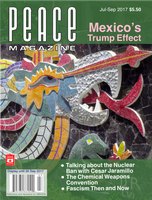
Peace Magazine July-September 2017, page 4. Some rights reserved.
Search for other articles by Metta Spencer here
As we go to press, the word from New York is upbeat: we are likely to have a new, legally binding convention or treaty banning nuclear weapons from the face of the earth. If you don’t hear that news in the mainstream press, it’s not by chance but design. Somebody doesn’t want you to know. Peace Magazine readers are not conspiracy-minded, but in this case, there is a conspiracy among five nuclear weapons-owning states and their allies, including Canada. Abolishing nuclear weapons, as the vast majority of humankind desires, would be a huge change that they have not planned for. So it’s up to us to make it into a demand.
But the weak publicity surrounding the enactment of a new international law is partly our own fault. We have not demanded enough action for decades—indeed, since Gorbachev and Reagan agreed to reduce their nuclear arsenals. Believing that the problem was solved, most people turned to other issues—recently climate change.
So what’s our next move? How are we going to act to push the hold-out states to sign this new document and actually abolish those horrendous threats to civilization?
Answer: We need to re-engage with the issue, though now we have a lot of other risks facing us, so it’s hard to focus attention on just nuclear weapons.
So we need to think big. We need to see that humankind’s existential threats are finite, inter-dependent, and the result of faulty human decisions that can be reversed if we address them as a package. There’s no competition between working on climate change and working on nuclear abolition. We have to handle both—as well as several other risks—or we’re sunk. Take cyber security, for example. (We haven’t even begun to prepare for that threat.) Or the impending loss of half of all jobs to automation. (Ditto.) Or even the current egregious levels of inequality, both political and financial, and between individuals, businesses, and states. (Ditto.) What we need is a comprehensive set of practical actions leading to the solution or reduction of all these dangers. Fortunately, it will be easier to address them together than separately, and it will be easier to bring our comprehensive platform of recommendations to public attention than to publicize them separately. Let’s start thinking big. Let’s set experts to work priorizing possible solutions, then call a conference to adopt the program. And then let’s roll up our sleeves and save the world together!

Peace Magazine July-September 2017, page 4. Some rights reserved.
Search for other articles by Metta Spencer here